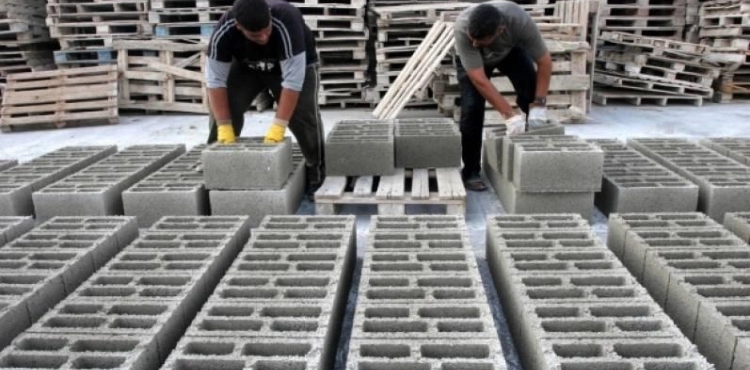Muhammad Al-Asar, Secretary of the Federation of Construction Industries in the Gaza Strip, announced that the size of losses of the construction industries sector, direct and indirect, during the first quarter of this year, due to the Corona pandemic, and the deterioration of economic conditions amounted to approximately $ 13.68 million , Indicating that the average production capacity declined from 27% to 11%.
Al-Asar said, "The direct losses of the construction industries were estimated from January to March last" 4.68 million "dollars, as a result of the fixed expenses incurred by the facilities, which are rents, employee salaries, maintenance of equipment and production lines, insurance and licensing of mechanisms, fees of municipalities and different ministries, electricity and water, and added "The total indirect losses are about $ 9 million during the three months, where lost opportunities and capital erosion without optimizing it, depreciation in equipment and machinery, and the time factor for the period of capital recovery without making better use of it." He pointed out that the number of factories Operating h 634 factories out of 819 establishments, and that the average production capacity shrank to 11.4% during the first quarter of this year, and last year it reached 27%.
Al-Asar pointed out that the block sector is the largest percentage of the total construction facilities, as the percentage of operating establishments is 63.5%, while marble owns 30%, while the concrete and tiles sectors occupy 4.6% and 1.4%, while the asphalt sector is one of the smallest sectors despite The magnitude of its capital and owns 0.5% of the construction facilities.
Al-Asar mentioned that the ratio of liquidity available to construction factories is only 20%, attributing the lack of liquidity to the presence of accumulated debts among customers, delays in the extracts of contractors collected by official or executing bodies and thus the enterprises are affected by that, and the lack of liquidity in the market due to the deterioration of economic conditions, and attributed the lack of liquidity The lack of proper turnover of project returns, and the use of liquidity by industrial enterprises for essential needs only because of its lack and the absence of satisfactory profit margins due to the presence of intense competition.
Al-Asar showed the importance of the construction industries sector among other productive sectors, as it is the largest in terms of the number of industrial establishments due to the multiplicity and diversity of its production sectors, in addition to the size of working and fixed capital approaching $ 120 million. He pointed out that the construction industries sector is the primary base for operating the other productive, handicraft and other commercial sectors, and it is the primary pillar of these sectors such as wood, aluminum, brick, electricity and plumbing industries.
Al-Asar called for a review of the civil defense fees imposed on construction factories, especially concrete factories, which amount to 2000 shekels annually, calling on the municipalities to provide facilities and discounts on fees in general in order to reduce the burdens on industrial establishments, especially after an increase and additions to items were noted Invoices .
Al-Assar reviewed other obstacles facing construction industries, such as the suspension of loans to employees through banks due to the lack of full salaries, the lack of new funded projects during the year 2020 AD, and the blockade imposed on the entry of construction materials by applying the system of reconstruction (system) (GRM), which increases the burdens and losses Establishments during previous years, lack of cash liquidity, and scarcity of marketing operations due to the weakness of the market The Secretary of the Construction Industries Union urged donor institutions to follow financing policies that are appropriate to the real needs of the productive sectors, develop production lines, and complete the completion of Rana The reconstruction of the construction industries sector in order to increase the employment of workers and increase production capacity, and implement emergency relief projects to assist the workers segment periodically.












